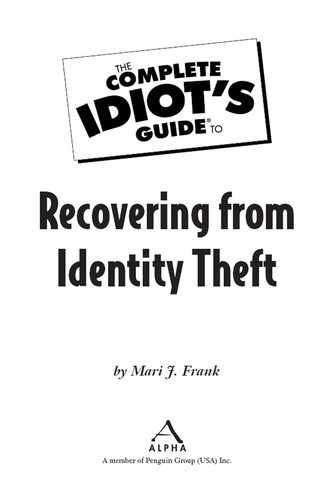Look for the Sneaky Signs
Now we will deal with other financial fraud that may not appear on consumer reports:
♦ Cell-phone accounts
♦ Apartment leases
♦ Utility bills
♦ Gasoline credit cards
♦ Scam employment
♦ Insurance fraud
What makes these types of financial fraud harder to sort out is that when these types of companies grant new credit, they don’t report active accounts to the CRAs. Such entities as cell phone carriers, landlords, utility companies, and specialty retailers like the gasoline companies will initially check credit records with a CRA when setting up an account. However, they won’t report back to the CRAs once an account is opened. With your permission or your impostor’s consent (which companies take as yours anyway), many employers will inquire into your credit history as part of the hiring process.

Information = Power
I include scam employment here because there are identity thieves who will pass themselves off as you to get a job or to set up a business. Chapter 13 covers a variety of workplace fraud.
Because some creditors don’t report monthly account activity to the CRAs, those fraud accounts won’t show up in the credit-history section of the report, so at first glance you might think that you’re safe.
However, your credit report will give you a big tip-off to these types of fraud if you look closely. Remember from Chapter 4 that there is an “inquiries” section of your credit report. There are two types of inquiries. Soft inquiries, or soft pulls, are account reviews that companies are allowed to do when they have a relationship with you (or your impostor). Hard inquiries, or hard pulls, are always initiated by a creditor or a prospective employer who believe they have permission to check your entire credit profile because of a credit application you (or your impostor) have submitted.
Investigate the hard pulls carefully. If any company unfamiliar to you has received your credit reports, there’s a good chance that a fraudster passed himself or herself off as you. Detection of an unauthorized inquiry on your credit record helps you to fix the problem early. Here are the steps to take:
1. Order your free credit report (after placing a fraud alert) from all three CRAs using the steps in Chapter 4.
2. If you find unauthorized inquiries either as an account review from a company that you don’t know, or from the section that shows a company accessed your report in order to issue new credit, immediately call the company to find out why the company reviewed your report. If the phone number of the company doesn’t appear on the report, look it up online or contact the credit bureau for the contact information.
3. While on the phone, after learning why the hard-pull inquiry appeared on your credit profile, get the mailing address of the entity’s fraud department and write a follow-up letter saying that you did not authorize the inquiry. In the letter, tell them not to issue an account to the fraudster. Ask for a copy of the application and any billing statements, and closure of the account if one was already initiated so you can stop the fraud before it proceeds to collections.
4. Also follow up in writing with the CRAs. Dispute each fraudulent hard inquiry with the CRAs. If account reviews are for fraudulent accounts, ask that they be removed. Your credit score is affected by “hard pulls,” so you must remove the scam inquiries.
5. Dispute each unauthorized inquiry with the creditor, demanding all available information, as you would for fraudulent accounts that show up on the account history section of your credit report, as Chapter 6 explains. Demand that the company or individual report back to the CRA, indicating that the inquiry it made was based on a fraudulent request from an identity thief and that it should be deleted from your record.
Once you review the application and correspondence the fraudster supplied to the company, you can file an amended law-enforcement identity-theft victim report, as explained in Chapter 3. Close the fraud account if opened, prevent collections, and stop the impostor’s further use.

Identity Crisis
You must dispute the inquiry with the CRAs for two additional reasons. One is that by doing so at the start, you preserve all your rights under the Fair Credit Reporting Act. The other is because these inquiries show up on the report issued to any third party, lending credence to those accounts.
..................Content has been hidden....................
You can't read the all page of ebook, please click here login for view all page.
